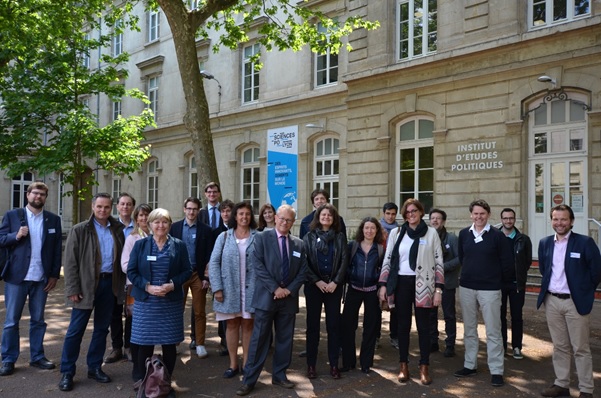Mae'r cynnwys hwn ar gael yn Saesneg yn unig.
WISERD’s latest working paper outlines the main proceedings of an international conference held at Sciences Po Lyon, France, on 4 May 2018. The symposium and subsequent working paper was led by Professor Alistair Cole (Professeur de Science Politique, Directeur du pôle Stratégie et partenariats internationaux, Sciences Po, Lyon and WISERD). The new publication pulls together several research initiatives around the central theme of trust-transparency paradoxes.
Trust (and mistrust) lies at the heart of contemporary debates regarding governance and democracy. Key debates focus on whether the level of trust in democracy is rising or falling over time and the extent to which citizen trust is a prerequisite for good democratic government. Problems of democratic deficit, of the misfit between politics and policy, and of political corruption apparently undermine trust in politicians and underpin the emergence in most EU polities of forms of populist party responses.
This new working paper engages with recent research suggesting that while the public has confidence in democracy as a concept, many do not trust government and the way democracy is currently being implemented. Despite calls for more citizen involvement in decision-making, however, citizen engagement and satisfaction rates are declining. There is a strong and growing demand for more diverse and effective forms of citizen engagement to increase levels of trust and engage an increasingly diverse, busy and complex urban population.
The working paper is an output of the international collaboration between the TRIANGLE, the main Lyon-based social science research laboratory, and WISERD, the research institute representing the leading social science cluster of Welsh universities. The new publication presents the following eleven chapters authored by a series of leading academics:
- Trust-transparency paradoxes: Evidence from the French regions – Jeanne Chauvel, Alistair Cole and Romain Pasquier;
- Trust-transparency dynamics in the UK and Germany – Ian Stafford and Dominic Heinz;
- Trust and transparency in media discourses: Paradoxical representations of the glyphosate controversy – Lise Jaquet, Isabelle Garcin-Moreau and Simon Gadras
- Europe’s ambivalent transparency – Cécile Robert
- Trust, territoriality and third sector engagement in policy-making and welfare provision: Exploring the trust pathologies of welfare pluralism – Paul Chaney and Christala Sophocleous
- Mobilising business in favour of the Aix-Marseille-Provence metropolis (2007–2016) – Christophe Parnet
- The role of political alienation in the UK’s Brexit vote – Stuart Fox
- Restructuring the state: Mid-level bureaucrats between loss of autonomy and empowerment – Julien Barrier and Olivier Quéré
- The changing frontiers of the state and civil society in education: A comparative analysis of France and Wales – Sally Power, Chris Taylor, Daniel Franji and Philippe Vitale
- Education, cities and partnerships in France and England – Renaud Morel
- Accountable and/or responsible? School accountability and its forum: Elements from a France–Quebec comparison – Hélène Buisson-Fenet
Download the full working paper:
Pictured above, from left to right: Stuart Fox (Cardiff University, WISERD), Jerome Reneaudin (National Federation of Disabled-friendly Companies), Paul Chaney (Cardiff University, WISERD), Benedicte Ollaigne (Life Coach), Sally Power (Cardiff University, WISERD), Christophe Parnet (Sciences Po Lyon, TRIANGLE), Dominic Heinz (Cardiff University, WISERD), Thibault Riouffreyt (TRIANGLE), Caroline Ancely (Editorial Assistant), Hélène Buisson-Fenet (École normale supérieur, CNRS, TRIANGLE), Alistair Cole (Sciences Po Lyon, TRIANGLE, WISERD), Isabelle Garcin-Moreau (Sciences Po Lyon, ELICO), Simon Gadras (University of Lyon 2, ELICO), Cécile Robert (Sciences Po Lyon, TRIANGLE), Olivier Quéré (TRIANGLE), Jeanne Chauvel (Sciences Po Rennes, ARENES), Daniel Franji (École normale supérieur, TRIANGLE), Ian Rees Jones (Cardiff University, WISERD), Thomas Scapin (Sciences Po Lyon, TRIANGLE), Ian Stafford (Cardiff University, WISERD).

